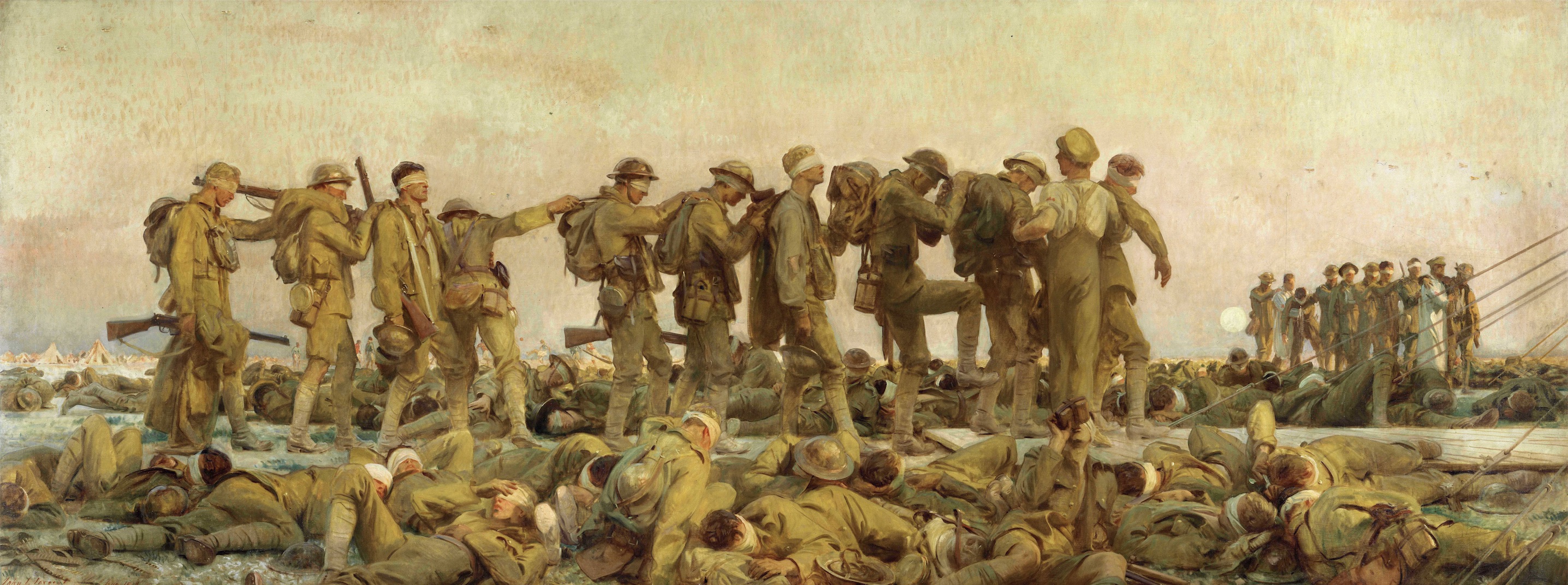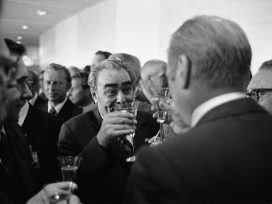In many historiographical circles, there was an accepted consensus, which treated WWI as the turning point that lead to the decline of great empires. This is true especially for the watershed year of 1917 when the first (Russian) empire crumbled; first with the February and later with the October revolution, which was, in fact, a coup d’état. Yet viewing WWI as the end of imperialism is too Europe-centric a concept and needs to be amended.
The global history of empires
One can by no means deny that WWI was a turning point for the Russian, the Austro-Hungarian, the German and the Ottoman empires that were erased from the map of Europe. The reasons leading to their downfall were complex and multifaceted, from national contentions to social turmoil. One can of course not ignore the fact that all four empires were defeated in the Great War, and that all of them, except the German, were continental empires.
However, WWI needs to be understood in the global context. In this perspective, we step into a first problem already in the periodization of WWI. In most of Europe, we fix the timeline of WWI between 1914 and 1918. Nevertheless, historians Robert Gerwath and Erez Manela argue that WWI should be understood in terms of a broader and longer cycle of violence, starting with the Italian attack on the Ottoman Empire in Libya in 1911. The Balkan Wars – the ‘Yugoslav Easter’, as the Slovenian writer Ivan Cankar emphatically called them – followed shortly after. And although the bulk of the fighting took place between 1914 and 1918, the cycle of violence ended only in 1923 with the Treaty of Lausanne which ended the war between Greece and Turkey. With the largest population exchange between states thus far, the treaty also ended a cycle of ethnic cleansings, a specificity introduced to the European continent during the Balkan Wars which reached a climax with the Armenian genocide.
In 1922, the bloody civil war in the former Russian Empire came to an end, leaving behind a death toll of between four and five million. The same year, another civil war ended in Ireland with the establishing of the Irish Free State. In the Far East, Japan abandoned the penetration of Siberia and satisfied its appetites with keeping hold of Korea and of strategically important islands in the Pacific, as well as strengthening its influence in China. The world was never the same again. As a certain Italian journalist named Benito wrote in the Il Popolo d’Italia, there was not even one piece of the Earth that was not caught by the war and shaken to its core: ‘In the old Europe, men disappear, systems break, institutions collapse.’

‘Gassed’ by John Singer Sargent. Part of the Hall of Remembrance, a series of paintings and sculptures commissioned, in 1918, by the British War Memorials Committee of the British Ministry of Information in commemoration of the dead of World War One. Photo source: Wikipedia
Now let us return to the starting issue of the ‘turn’ that initiated the dissolution of empires. Apart from the aforementioned continental empires, all the other empires (the British, the French, the Japanese and the American) not only survived the war but became larger and economically stronger.
For a very long time, historians researching these overseas empires had focused only on each single one of them. Whenever they drew comparisons, they tended to focus on the differences in colonial rule: which colonial power was more successful in using local notables and letting them reign under their supervision; who, on the other hand, enforced white (or Japanese) administrative body, and so on. However, during the last fifteen or twenty years, a significant shift has taken place in the international academic sphere. Historians started to focus on transnational, international and global history – trendy and modern approaches in today’s international academia. Differing from their elder colleagues, they shifted their inquiry from the enumeration of differences to the question of inter-imperial cooperation. As a result, today we have a much better insight into the various activities of the empires which developed through intense mutual cooperation from the mid-19th century onward.
Drawing upon these, it is no surprise, that the leading positions in botany, forestry, and biology in British India were filled by individuals educated at German universities, since they were the leading ones in this fields. The British built railroads in Portuguese Mozambique, South America, and China. The empires also used neighboring colonies – even ones under the rule of another country – as connections and logistic support for their territories, whenever economic rationale demanded so. Japanese students were among the best performers at British universities, while Japan received building parts for their fleet from Scotland. It was quite common in the second half of the 19th century that delegations of many European empires visited Dutch East India (nowadays Indonesia), which was regarded at that time the most exemplary colonial system. Other empires copied the Dutch administrative system, adjusting it, of course, to their specific needs. It is worth pointing out that even Christian missionaries of certain denominations operated within empires of different prevailing religions; take, for instance, German protestant missions in the Portuguese colonies. The world before the WWI was global, and the empires were not hermetically closed systems but living organisms.
The empires strike back: the restoration of the ‘civilizing mission’ after WWI
Of course, one should emphasize that the European empires were based on the ideology that understood the white race as supreme. Until WWI, their colonialism was justified on the grounds of the Europeans’ ‘civilizing mission’, the alleged purpose of which was to elevate the primitive peoples to the level of modern civilizations. Under this pretext, the Portuguese were involved in slave trade at least until the end of the 19th century, even though the European empires agreed at the Brussels conference of 1890 to abolish the slave trade completely. However, even afterwards, the trade in humans continued disguising them as low wage workers without any rights, supposedly ‘migrating’ inside the colony or the empire. The worst cases of such practice were to be found in Portuguese and Belgian African colonies.
In 1917, the Bolsheviks took over the Russian Empire, and in 1922 the Soviet Union was established. Not unlike the prewar empires, the Bolsheviks, too, followed their own version of the ‘civilizing mission’. Numerous tribes, clans and small nations in the Far East, Central Asia, and the Caucasus, were “equipped” with national and cultural institutions, and the usage of vernacular languages was encouraged. The rationale was that this ‘civilizing effect’ would be instrumental for a faster pace of development, in order to elevate them to the same cultural and economic level as other Soviet nations. However, the Soviet policy of korenizatsiya maintained a non-symmetrical relationship between the center and the periphery, which even intensified under Stalin. Hence, the Soviet Union can be understood as a vast Empire, which also had expansionist aspirations that were clearly shown in 1939 with the invasion of Poland, and later with the annexation of the Baltic states and the war with Finland.
However, the reinforcement of imperial power was a general trend after WWI. The new Versailles order might have been established in a genuinely sincere yet naive spirit of guaranteeing good international relations, with the establishment of the League of the Nations and the Mandate system. This spirit was embodied in Wilson’s famous fourteen points from January 1918, which brought hope to many small nations around the world aspiring to a free and prosperous life in a peaceful and safe international environment. However, American internal politics undertook a great shift when the Democrats lost the majority in both houses of Congress. By 1920, the USA retreated to its isolationist policy, rejecting to sign the Versailles treaty for the second time and never occupying its reserved seat in the League of Nations.
With the USA retreating from the international stage, France, and the UK, with the help of their allies (Japan, Belgium, and others) partitioned the former territories of the Ottoman and German empires. They were allocated into three categories. Group A consisted of former Ottoman territories in the Middle East, from which the UK received Palestine and Mesopotamia, while France took over Syria. Group B was formed by former German colonies in Africa, with the British getting Tanganyika (the continental part of what is today Tanzania) and dividing Cameroon and Togo with the French, while Belgium became the caretaker of Ruanda-Urundi. The third group (C) encompassed the remaining German colonies in Africa and the Pacific. The latter ones were divided between Japan and the UK, with the British taking control over the German New Guiney, Nauru, German Samoa and Southwestern Africa (today’s Namibia). A characteristic feature of the British colonies in group C is that they were not under direct rule from London but were placed under the supervision of dominions or members of the Commonwealth: Australia, New Zealand, and South Africa. The empires hence expanded their territories, with the British entering a new phase of development. Its autonomous “subunits,” the dominions, took control over former German colonies in their surroundings. The empire was stretched into a hierarchically controlled pyramid system.
The purpose of the mandates was, again, partially a civilizing mission, in the spirit of the imperial discourse before WWI. Jan Smuts, prime minister of South Africa between 1919 and 1924 and again between 1939 and 1948, stated already in 1915, that only ‘barbarians’ lived in the German African and Pacific colonies. Since they are not capable of governing themselves, as Smuts argued, it would be unpractical to explain the concept of self-government to them, as they would not understand it anyway. The mandates from group A, according to contemporary discourse, had already achieved a satisfactory level of development and thus needed only a smaller leap to govern themselves, while the mandates from group B needed a more robust hand to govern them. However, imperial managers were not allowed to build any military bases in these territories, and they also had to allow freedom of religion and conscience. On the other hand, mandates from group C were governed as an integral part of the empire that took control over them.
Global politics and the empowerment of the colonized
Nonetheless, uprisings in the colonies started soon, not only in the mandate territories but in overseas colonies in general. These were stimulated by the vast number of demobilized soldiers from WWI, who had fought inside their colonial units frequently for the promise of national independence that then never came true. And one can also trace the influence of Wilson’s fourteen points. Already in 1920, there were uprisings in Iraq which lead to the establishment of the Iraqi kingdom a year later and to the Anglo-Iraqi Treaty of 1922, which de facto abolished the British mandate for Mesopotamia. In 1932, Iraq became a free state – the only mandate that achieved its independence before WWII. The French administration was challenged in Morocco in 1925–1926, in Syria in 1925–1930, in Congo in 1928–1931 and in Indochina in 1930–1931.
Even though the empires expanded territorially and were economically reinforced after WWI, they also became vulnerable in the ever more globalized world. In contrast to the prewar period of cooperation, they also started to shut themselves off from outside influences. In 1920, the volume of international trade was smaller than in 1914. After the Great Depression, the empires began to withdraw even further with high tariffs and other protectionist measures.
On the one hand, the power of uprisings increased, and new international rules provided new opportunities. From 1921 onwards, the mandates’ inhabitants could send petitions to the Permanent Mandates Commission if they thought that mandate rules were broken. These petitions surpassed all expectations. For example, inhabitants of German Samoa wrote several petitions in the two decades of the interwar period complaining over New Zealand’s misrule. These petitions were delivered to the League of Nations as well as to the British monarch. In their petition from 1924 they expressed their disappointment with New Zealand’s administration, stressing that they were educated enough to take the administration into their own hands. However, all petitions and requests remained unanswered. Since their collectors did not have access to the ruling circles, even though they traveled all the way to London or Geneva, their complaints were ignored. Nevertheless, a period of the mass global political participation had started.
As the common people learned ‘to play’ the new international rules, by writing petitions, organizing protests or threatening with the international court in Hague, so did the elites start to abuse the specific political language introduced with the Versailles order. When Germany joined the League of Nations in 1926, this international institution gained intense internal opposition, turning the platitudes on free international trade to its advantage. Under the disguise of free trade – defended by the League of Nations – Germany started to establish corporate headquarters in its former colonies. Through these, Germany swiftly gained back much of the political influence lost at the outset of the new Versailles order.
The postwar period was not only an era of increased mass political participation: it was also the dawn of global mass media, in which the new technologies limited the arbitrary practices of imperial powers. When Mussolini attacked Abyssinia (Ethiopia) in 1935, around 200 journalists were already there, out of which 170 had non-Italian accreditations. The Italian empire could not justify the use of toxic war gasses by referring to its ‘civilizing mission’ without the objection of the international community. For the first time, colonizers were labeled non-civilized. When Italian authorities could not prevent the Ethiopian monarch Haile Selassie from addressing the League of Nations, Italian journalist were handed whistles, which they started blowing at the moment when Selassie started to speak. The Romanian delegate Nicolae Titulescu was so furious with the self-proclaimed descendants of the Roman civilization that he shouted: ‘Out with the savages!’ (‘À la porte les sauvages!’). The power structure of civilizers and those to be civilized was turned on its head.
*
The first World War brought the decline of some empires, while others flourished even more. The other side of the coin is often neglected in the contemporary European discourse, as we tend to focus too much on the specifics of our territory. And yet, as I have shown here, it is necessary to look at WWI, commonly understood as the turning point or the beginning of the end of the age of empires – cum grano salis.







